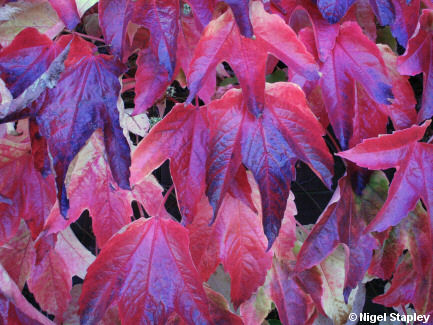 The Judge
RAVES!
The Judge
RAVES!
Date: 13/11/24
"Through Autumn's Golden Gown..."
One of the pop era's greatest and most affecting songs of love, loss and longing came from what, on the face of it, would be considered an unexpected direction, and the melody used itself had a curious origin.
First of all, listen to this piece of music from 1969:

(It says that it was for a radio commercial, but there were no legal commercial radio stations in UKania at that time, so this may have been for RTÉ in Ireland, Radio Luxembourg or one of the Dutch semi-legit stations).
The tune was written by US-born composer and producer Jeff Wayne. A little later, he made a full song about it with lyrics co-authored with the two singers on the ad, Paul Vigrass and Gary Osborne. Indeed, the song - now entitled Forever Autumn - appeared on Vigrass and Osborne's 1972 album Queues:

If this version seems a bit too fast, then that is only because of greater familiarity with its later incarnation. Slowing the playback speed down to '0.75' will overcome that impression. Some have commented that it sounds a bit like the Moody Blues, and this turns out to be both perceptive and prophetic in roughly equal proportions.
The track was issued on a single, but as the B-side in every 'territory' except Japan, where it reached no.2 in the charts.
Fast forward to 1976, and Jeff Wayne is putting together the project which would become his musical version of H.G. Wells' novel The War Of The Worlds. At one stage in the story, Wayne felt that he needed a song rather like Forever Autumn for the point in the plot where the narrator gets separated from his lover, Carrie...
...Which is one of the inventions and conflations which form the adaptation; in the novel, the narrator merely refers once or twice to his wife, with no mention of any other romantic interest. Which is probably just as well, since it would make the narrator into an adulterer and Carrie into a floozy...
...until Wayne decided that the best way forward was simply to use Forever Autumn, with suitable adjustments to the tempo and cadence.
There then came the issue of who to get to actually sing it. Wayne decided that he wanted the voice he had heard on the Moody Blues' Nights In White Satin (another song of yearning) from nearly a decade before. He contacted Justin Hayward, who duly went along to the studio to record the vocal parts (lead and backing). Having been given an explanation of the whole project, Hayward then got more involved, recording lead vocals on The Eve Of The War and contributing some guitar work.
And then...silence. At least until the early summer of 1978 (my sixteenth birthday, in fact) when the double album (remember those, kids?) was released. The previous week, as a taster, a single edit of Forever Autumn was issued, where the near-eight-minute album track was edited down to a little over half that length, entirely excising as it did Richard Burton's narration and the full-length track's reversions to the project's main musical motif.
Despite scepticism - not to say bafflement - from many quarters (including not only Hayward but CBS Records, who were footing much of the bill for all this) as to who would want to buy a 95-minute mixture of rock opera and radio play, the album (with many of the lyrics provided again by Vigrass and Osborne) was an immediate and galactic success, having in the four and a half decades since its release sold an estimated fifteen million 'units'. Forever Autumn itself fared slightly less well, getting into the top five only in the UK and Ireland and stalling outside the top thirty nearly everywhere else. Nonetheless, for its simple, heartfelt lyrical sentiments, for the soulful interpretation of them by Hayward and the masterful arrangements by Wayne, it has become a classic which still deeply moves the listener even when it has become so familiar. I know it does me; in fact, it did me again listening to it whilst writing this piece, which caused a pause necessary for me to wipe my eyes and blow my nose.
The aesthetic experiences we have between the ages of about twelve and eighteen are the most piercing, the most poignant which we ever have, caught as we are at that point of delicate balance between knowing little and knowing too much. And such experiences are - as I have said so many times before - stimuli to the most vivid of memories. Hearing Forever Autumn takes me back - as does this track - to the time when I was finally able to wave goodbye to the wretched, bully-ridden dump of a high school in which I had been captive for five years and look forward to better - or certainly to freer - times.






 The Judge
RAVES!
The Judge
RAVES!











